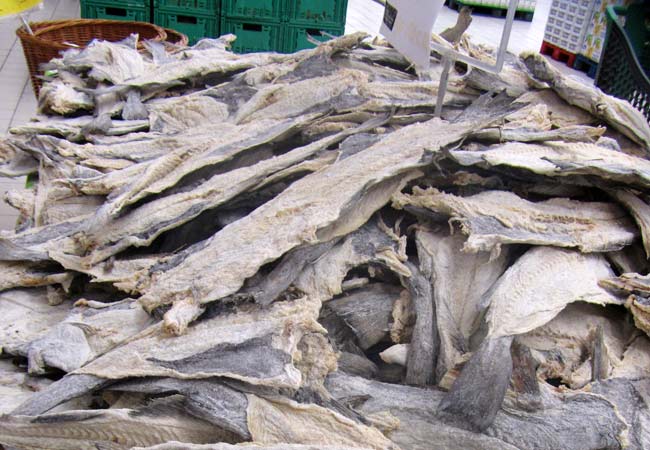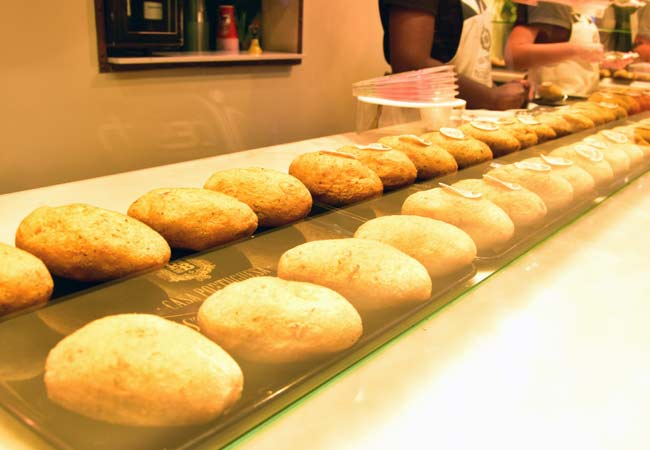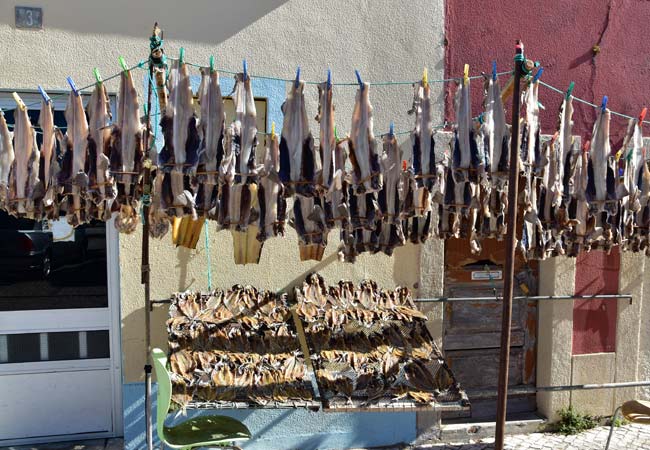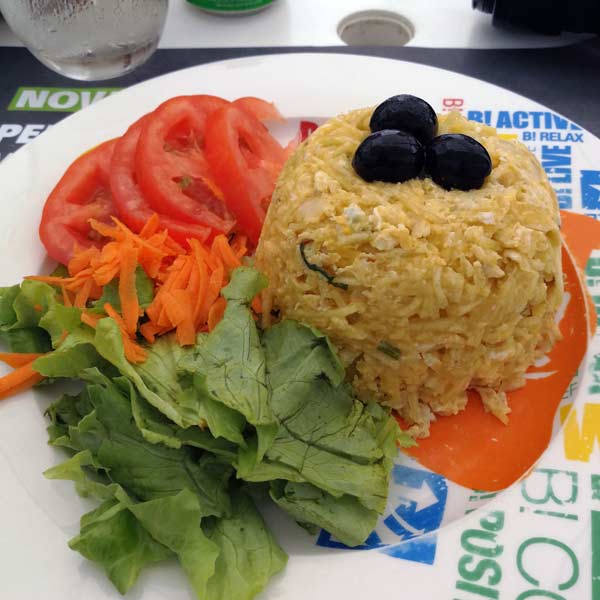LisbonLisboaPortugal.com
The best independent guide to Lisbon
LisbonLisboaPortugal.com
The best independent guide to Lisbon
Bacalhau Salted Cod Fish Portugal
Bacalhau (salted codfish) is the most popular base ingredient in Portuguese cooking. The country has a love affair with the pungent-smelling dried fish, which supposedly has 365 different dishes, one for each day of the year.
Bacalhau is codfish that has been doused in vast quantities of salt and dried under the Mediterranean's hot sun. This ancient method of preservation means the cod can be stored indefinitely at ambient temperatures, with no bacterial or mould able to grow on the highly saline dried codfish.
The traditional method to salt and dry the codfish involves the cod cut lengthwise and hung from the caudal fin. To prepare the Bacalhau for consumption, it is soaked in freshwater for a minimum of 24 hours, with the water being changed to reduce the intensity of salt. The prepared Bacalhau is a very versatile protein that can be boiled, fried, stewed, roasted, or grilled, creating many varied dishes.
Related articles: The best dishes to try while in Lisbon

Bacalhau piled high in the super markets
History of Bacalhau salted codfish
The history of Bacalhau can be traced back to the 14th century and the exploration era of the Portuguese. The dried and salted cod could be kept in the ships holds for literary years, and fresh supplies could be obtained from the oceans during a voyage. Bacalhau became a staple part of the Portuguese navy's diet from 1497 with the discovery of vast reserves of cod off the shores of Newfoundland.
Cod is not found native to the coastline of Portugal and could only be fished from the distant and dangerous waters of Newfoundland. The seas surrounding Portugal are abundant with sardines, but these could not be salted.

Pasteis de Bacalhau are a delicious savoury snack
For the drying and preservation process to occur effectively, there needs to be a low level of oils and fats in the fleshly sections of the fish. These oils and fat repel the saline water used in the salting process and prevent the salt from preserving the fish.
Cod and other white fish have very low levels of oils, and the small amount is concentrated in the guts. This salting process also introduced the gutting stage of fish preparation, which is common with today's cooking.
The fish commonly found in Portuguese waters, such as sardines and other oily fish, could not be salted. The last reason the Portuguese navy introduction of cod as a staple food in their diet, was the sheer size of the cod reserves discovered off the coast of Newfoundland.
Before the 16th century, the cod was salted and dried on the coastline of Newfoundland, but later the British started to defend their territory and prevented Portuguese fishermen from landing.
To compensate, a new technique was used by the Portuguese fishermen, which involved brining the fish in large vats of saltwater and transporting them back home undried. Once in Portugal, the cod were sold at markets and dried by villagers – This classical method is still seen in certain areas of Portugal, where the cod is hung to air dry.

Bacalhau being dried in the fishing town of Peniche
Bacalhau had a resurgence during the early 20th century under the Salazar dictatorship when it designated a key food commodity for labours and industrial workers. The government of the 1940/50s ensured the price of Bacalhau was kept affordable, there was a constant supply, and undertook a marketing campaign, promoting it's befitting and cooking styles.
Many of the ideas of cooking Bacalhau 365 different ways originate from this era, when it was the only constant source of protein for many working families.
Insight: Today, Bacalhau is mainly produced by Norway
Common Dishes Based upon Bacalhau Salted Cod Fish
One of the more appetizing Bacalhau dishes is called Bacalhau com Natas (Bacalhau and cream), a rich and creamy potato baked dish. Bacalhau is so ingrained in the Portuguese national psyche that Bacalhau com Natas is served as the main celebrational meal at Christmas.
Pasteis de Bacalhau is an appetizer or light meal in which the Bacalhau is formed into croquettes.
Bacalhau à Brás originated from the Bairro Alto district of Lisbon and combines shredded Bacalhau with thinly cut potatoes bound together by scrambled egg. The diversity of the three previous dishes may provide a basis for the myth that there are 365 different methods to serve Bacalhau.

Bacalhau à Brás
Discover more of Lisbon with our most popular guides
If you've found our content valuable, we'd welcome your support.
The digital publishing landscape has evolved significantly. As a small independent publisher, we face growing challenges. Search engines increasingly favour paid content over organic results, while AI-generated content often reproduces original work without attribution.
To support our work, please consider bookmarking this page (press Ctrl + D) for quick access. If you find an article helpful, we'd be grateful if you'd share it with friends on social media.
For specific questions, please see our Reddit community at r/LisbonPortugalTravel.
Should you notice any outdated or incorrect information, please contact us at [email protected]
Thank you for helping us continue to provide valuable content in an increasingly challenging digital environment.
A complete list of all of our Lisbon articles
If you've found our content valuable, we'd welcome your support.
The digital publishing landscape has evolved significantly. As a small independent publisher, we face growing challenges. Search engines increasingly favour paid content over organic results, while AI-generated content often reproduces original work without attribution.
To support our work, please consider bookmarking this page (press Ctrl + D) for quick access. If you find an article helpful, we'd be grateful if you'd share it with friends on social media.
For specific questions, please see our Reddit community at r/LisbonPortugalTravel.
Should you notice any outdated or incorrect information, please contact us at [email protected]
Thank you for helping us continue to provide valuable content in an increasingly challenging digital environment.































